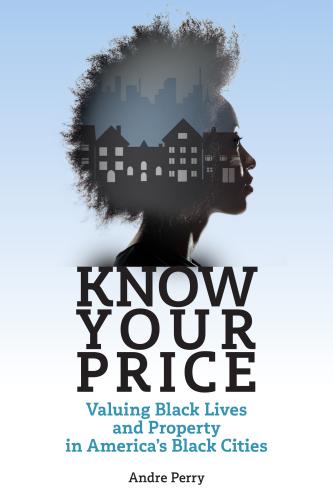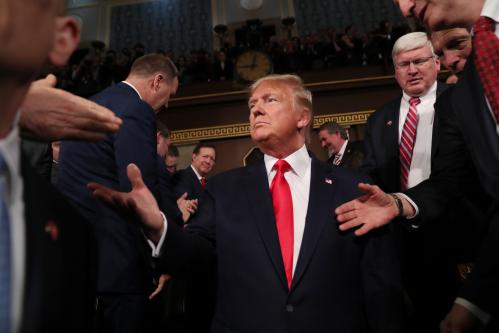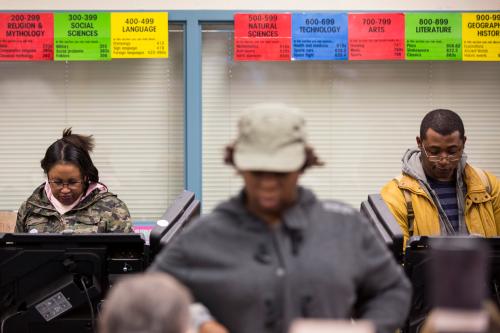Last week, comments surfaced from a 2008 lecture by former New York City mayor and current Democratic presidential candidate Michael Bloomberg, in which he asserted that the period’s housing crisis was due to the end of “redlining,” the mid-20th century discriminatory practice that made home loans unavailable in Black neighborhoods. Bloomberg’s conclusion is utterly contradicted by the facts, but it persists because it reinforces one of the most pernicious narratives of the American economy: that the economic and social statuses of poor and Black people are of their own doing.
“It probably all started back when there was a lot of pressure on banks to make loans to everyone,” Bloomberg said in the 2008 Georgetown University lecture. When “Congress got involved” and decided redlining was unfair, he continued, “banks started making more and more loans where the credit of the person buying the house wasn’t as good as you would like.” This, Bloomberg claims, is what sparked the Great Recession.
Bloomberg’s argument—one that he has repeated over the years—is wrong from start to finish. Take his definition of redlining: “Redlining, if you remember,” Bloomberg said, “was the term where banks took whole neighborhoods and said, ‘People in these neighborhoods are poor, they’re not going to be able to pay off their mortgages, tell your salesmen don’t go into those areas.’”
If you do not “remember” redlining as Bloomberg defines it, that’s probably because his definition is nonsense. Redlining was the U.S. government practice—operating through the Home Owners’ Loan Corporation—of defining the riskiness of mortgages based on the racial makeup of neighborhoods. Areas with sizable Black populations were marked in red ink on maps as a warning to mortgage lenders that those areas would be too risky to underwrite, effectively isolating Black people in neighborhoods that would suffer lower levels of investment than their white counterparts.
Redlining was not about banks identifying which neighborhoods were poor. It was, as historian Richard Rothstein famously described, “a state-sponsored system of segregation.”
Moreover, to link the end of redlining to the recent economic downturn is an egregious miscasting of the facts. The Fair Housing Act was 40 years old, and the Community Reinvestment Act was 30, before the economic collapse of 2008. Subprime mortgages were concentrated in the private market, and were commonly sold to homeowners who would have qualified for a safer loan. It was not government efforts to make homeownership affordable that provoked the risky investments that preceded the crash. It was predatory lenders’ greed.
Bloomberg was arguing that fair housing policies went too far, but in truth they have not gone nearly far enough. Black homeownership rates today have fallen to pre-1968 levels, before the Fair Housing Act outlawed housing discrimination. And Black neighborhoods continue to bear a stigma: a devaluation of $48,000 per home on average, even after controlling for factors such as housing quality, neighborhood quality, education, and crime. This amounts to a whopping $156 billion in cumulative losses.
We see the consequences of this stigma not only in our neighborhoods, but in our families. Black people in redlined neighborhoods were robbed of the ability to improve their homes and communities because the government only facilitated investment, development, and growth in white suburbs. Residents of Black-majority neighborhoods were not afforded the opportunity to pass on equity accrued from their homes to future generations. Today, white families have the highest median family wealth at $171,000—Black and Latino or Hispanic families have $17,600 and $20,700, respectively.
Policies such as redlining—which have concentrated wealth in the hands of the few while inflicting economic violence on poor people and minorities—have received rhetorical cover for far too long. The next president must address the real housing crisis in this country: unaffordable housing in segregated neighborhoods, the result of decades of policy built on racism and classism. Bloomberg is the eighth-richest man in the world; he should know better about where wealth in America really comes from and how it is gained and lost.
The Brookings Institution is committed to quality, independence, and impact.
We are supported by a diverse array of funders. In line with our values and policies, each Brookings publication represents the sole views of its author(s).









Commentary
Bloomberg’s comments on redlining distort a history of racism
February 20, 2020